This site contains explicit writings on kink practices, dominant/submissive relationships, and queer kink erotica (among other things). All characters in role play or non-consent scenes are consenting adults. Content warnings are included.
2010 was the first year I was pretty diligent about using GoodReads to record what I’ve been reading, and it tells me I read about 50 books in 2010—I think that’s not quite right, but I’m going to try to be even better about it this year. In fact, I’ve made it a “goal” on GoodReads to read 100 books—given that I’m reviewing lesbian erotica for Lambda Literary Foundation, editing two books, am a judge for a literary contest, and my monthly book group, and just that is more than 50 books, I think I can make it.
2011 Reading Challenge
read 16 books toward her goal of 100 books.
Looking over the books I have listed on GoodReads as read in 2010, these are the ones that stand out. Not all of these are queer explicitly, though queer novels remain my favorite thing to read. And not all of them were published in 2010.
All are linked to Amazon for research purposes, but please do order and buy them from your local independent bookstore—Support booksellers! Support local culture!
In alphabetical order, because it’s hard to compare:
 Aud Torvingen trilogy: The Blue Place, Always, & Stay by Nicola Griffith. I remember when Stay came out while I was working at the bookstore in Seattle (where I worked for almost 5 years as a bookseller), many people recommended it to me, saying I would like it. I think they assumed I would like it because I’m queer and it has a queer protagonist, but whatever. I (mistakingly) thought it was science fiction, and wasn’t so inclined to pick it up, but I finally picked up The Blue Place a few years ago (GoodReads says I read it in June 2009) and I was impressed. Well, first I kind of hated Aud Torvingen, the know-it-all, independently wealthy, accomplished-at-everything ex-cop turned private investigator who was trying to get her life together. But the end of the first book is so heartbreaking and good, I couldn’t just leave the characters suffering, so I had to read the other two in the series. I got hooked. And they just kept getting better. Easy, deep reading that I got lost in. I would read all of these again from the beginning.
Aud Torvingen trilogy: The Blue Place, Always, & Stay by Nicola Griffith. I remember when Stay came out while I was working at the bookstore in Seattle (where I worked for almost 5 years as a bookseller), many people recommended it to me, saying I would like it. I think they assumed I would like it because I’m queer and it has a queer protagonist, but whatever. I (mistakingly) thought it was science fiction, and wasn’t so inclined to pick it up, but I finally picked up The Blue Place a few years ago (GoodReads says I read it in June 2009) and I was impressed. Well, first I kind of hated Aud Torvingen, the know-it-all, independently wealthy, accomplished-at-everything ex-cop turned private investigator who was trying to get her life together. But the end of the first book is so heartbreaking and good, I couldn’t just leave the characters suffering, so I had to read the other two in the series. I got hooked. And they just kept getting better. Easy, deep reading that I got lost in. I would read all of these again from the beginning.
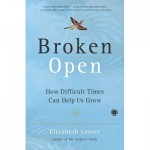 Broken Open: How Difficult Times Can Help Us Grow by Elizabeth Lesser. I’ve been a little obsessed with books about healing and trauma the past few years, and I ran into this in a bookstore and picked it up from the library right after. Frequently my favorite books in about this kind of thing take a very Buddhist perspective (like When Things Fall Apart, Radical Acceptance, and When the Past Is Present), and while I love that, I also know that until I had a pretty strong base in Buddhist philosophy, I didn’t quite understand what they were talking about, and I found them difficult to read. Not this one, though. Broken Open talks about trauma, loss, grief, and healing from lots of different perspectives, weaving in stories and techniques from her workshops over the years. Very readable and very inspiring.
Broken Open: How Difficult Times Can Help Us Grow by Elizabeth Lesser. I’ve been a little obsessed with books about healing and trauma the past few years, and I ran into this in a bookstore and picked it up from the library right after. Frequently my favorite books in about this kind of thing take a very Buddhist perspective (like When Things Fall Apart, Radical Acceptance, and When the Past Is Present), and while I love that, I also know that until I had a pretty strong base in Buddhist philosophy, I didn’t quite understand what they were talking about, and I found them difficult to read. Not this one, though. Broken Open talks about trauma, loss, grief, and healing from lots of different perspectives, weaving in stories and techniques from her workshops over the years. Very readable and very inspiring.
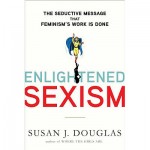 Enlightened Sexism: The Seductive Message that Feminism’s Work is Done by Susan J. Douglas. It’s not out in paperback yet, so I’ve still got the hardback copy from the library and have renewed it about 25 times now. I keep thinking I’ll get to a full review of it on Sugarbutch, and so I should go back and look through my notes and dog-ears to figure out exactly what I want to say. So here’s the paragraph version: I have thought about this book often since I read it. The descriptions of the 1990s especially made me realize I grew up in a unique time, full of the closest we’ve gotten to the manifestation of the feminist and gender equality movements, and the 2000s have brought plenty of backlash—but in a more subtle, twisted way than the backlash of the 1980s and early ’90s. Now, the backlash makes feminism look like it is outdated. Feminism? Pshaw, who needs that, women are equal now! But through various examinations of entertainment, celebrity, films, TV, and other pop cultural artifacts, Douglas argues that it’s far from over. It changed the way I am looking at feminism, and gave me some new ways to talk about what’s going on now. Now excuse me, I want to go re-read it.
Enlightened Sexism: The Seductive Message that Feminism’s Work is Done by Susan J. Douglas. It’s not out in paperback yet, so I’ve still got the hardback copy from the library and have renewed it about 25 times now. I keep thinking I’ll get to a full review of it on Sugarbutch, and so I should go back and look through my notes and dog-ears to figure out exactly what I want to say. So here’s the paragraph version: I have thought about this book often since I read it. The descriptions of the 1990s especially made me realize I grew up in a unique time, full of the closest we’ve gotten to the manifestation of the feminist and gender equality movements, and the 2000s have brought plenty of backlash—but in a more subtle, twisted way than the backlash of the 1980s and early ’90s. Now, the backlash makes feminism look like it is outdated. Feminism? Pshaw, who needs that, women are equal now! But through various examinations of entertainment, celebrity, films, TV, and other pop cultural artifacts, Douglas argues that it’s far from over. It changed the way I am looking at feminism, and gave me some new ways to talk about what’s going on now. Now excuse me, I want to go re-read it.
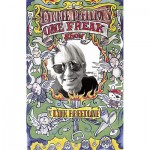 Lynnee Breedlove’s One Freak Show by Lynn Breedlove (Manic D Press, 2009). Just, awesome. I’m a fan, but I had no idea Breedlove is so funny! And readable, and smart, and clever. I identified with many of the struggles within the queer communities about gender, and loved the bits about cocks and sexuality. It was more than I expected, and made me feel like Lynnee is my buddy. I was able to be there when Lynn won the Lammy for in the Transgender category last year, and it was a thrill to hear a few of the best lines in the book delivered in person. My full review is up on LambdaLiterary.org.
Lynnee Breedlove’s One Freak Show by Lynn Breedlove (Manic D Press, 2009). Just, awesome. I’m a fan, but I had no idea Breedlove is so funny! And readable, and smart, and clever. I identified with many of the struggles within the queer communities about gender, and loved the bits about cocks and sexuality. It was more than I expected, and made me feel like Lynnee is my buddy. I was able to be there when Lynn won the Lammy for in the Transgender category last year, and it was a thrill to hear a few of the best lines in the book delivered in person. My full review is up on LambdaLiterary.org.
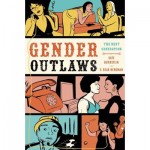 Gender Outlaws: The Next Generation edited by S. Bear Bergman & Kate Bornstein (Seal Press, 2010). Things have changed since Kate Bornstein’s book Gender Outlaw, and this is the updated proof of the celebration and liberation that’s happening within the trans landscape right now, and the proof of how much further we have to go, and what else we need to work on. I would put this on my “required reading” list, and I bet a lot of other people out there would too. It’s a beautiful anthology. I especially love Bear and Kate’s introduction, which is a conversation via internet chat. My review on Sugarbutch and my companion piece, Ten Ways I am a Gender Outlaw.
Gender Outlaws: The Next Generation edited by S. Bear Bergman & Kate Bornstein (Seal Press, 2010). Things have changed since Kate Bornstein’s book Gender Outlaw, and this is the updated proof of the celebration and liberation that’s happening within the trans landscape right now, and the proof of how much further we have to go, and what else we need to work on. I would put this on my “required reading” list, and I bet a lot of other people out there would too. It’s a beautiful anthology. I especially love Bear and Kate’s introduction, which is a conversation via internet chat. My review on Sugarbutch and my companion piece, Ten Ways I am a Gender Outlaw.
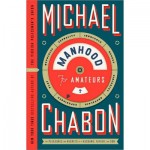 Manhood for Amateurs: The Pleasures and Regrets of a Husband, Father, and Son by Michael Chabon. A personal account of gender and masculinity insights throughout life, with illustrations of various relationships—friendships, marriage, kids, parents. I really love his writing, he has such a beautiful way of constructing a sentence, and I was really moved by his descriptions of feminism. Though maybe I shouldn’t be, I was surprised to find a straight white cis man writing so eloquently about gender dynamics and providing insight into so many of the difficulties that are imposed upon us in gender roles, and I think his accessibility brought these concerns to a lot of people since this book was published. It’s a great starting place for examining masculinity in more depth (which is one of the things I hope to do this year, and I have about five books waiting for me).
Manhood for Amateurs: The Pleasures and Regrets of a Husband, Father, and Son by Michael Chabon. A personal account of gender and masculinity insights throughout life, with illustrations of various relationships—friendships, marriage, kids, parents. I really love his writing, he has such a beautiful way of constructing a sentence, and I was really moved by his descriptions of feminism. Though maybe I shouldn’t be, I was surprised to find a straight white cis man writing so eloquently about gender dynamics and providing insight into so many of the difficulties that are imposed upon us in gender roles, and I think his accessibility brought these concerns to a lot of people since this book was published. It’s a great starting place for examining masculinity in more depth (which is one of the things I hope to do this year, and I have about five books waiting for me).
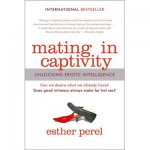 Mating in Captivity: Unlocking Erotic Intelligence by Esther Perel. I didn’t expect to like this one as much as I did—I thought it would be pretty elementary, but it had some great insight into American culture and relationships. Perel is not American, and that outsider perspective was at times really interesting and useful. Of course, it is 99% heterosexual, and when she tries to include queer couples it doesn’t really account for any sort of difference in culture, but glosses over the difference and goes right to “all relationships have their difficulties, doesn’t matter if you’re gay or straight,” which I get, but I think there’s a little more to it than that and it’s a little bit of a privileged position to be able to dismiss the queerness as just a personality trait akin to liking sports or being into cooking. Nevertheless, the tips and consciousness around building a long term relationship that remains sexual are important, and I’m glad I read it. My full review on Sugarbutch.
Mating in Captivity: Unlocking Erotic Intelligence by Esther Perel. I didn’t expect to like this one as much as I did—I thought it would be pretty elementary, but it had some great insight into American culture and relationships. Perel is not American, and that outsider perspective was at times really interesting and useful. Of course, it is 99% heterosexual, and when she tries to include queer couples it doesn’t really account for any sort of difference in culture, but glosses over the difference and goes right to “all relationships have their difficulties, doesn’t matter if you’re gay or straight,” which I get, but I think there’s a little more to it than that and it’s a little bit of a privileged position to be able to dismiss the queerness as just a personality trait akin to liking sports or being into cooking. Nevertheless, the tips and consciousness around building a long term relationship that remains sexual are important, and I’m glad I read it. My full review on Sugarbutch.
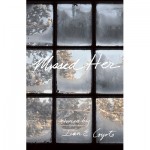 Missed Her by Ivan Coyote (Arsenal Pulp Press, 2010). It wasn’t until I was telling a friend about the book that I realized that “Missed Her” is often mistaken as “Mister” in speech. What can I say about Ivan? She’s a masterful storyteller. She and I grew up in a similar region, and her tales about her childhood and her extended family feel so familiar and nostalgic and articulate in such a beautiful way. I love the descriptions of her new relationship love. I will continue picking up every book she puts out, and I’ve never been disappointed.
Missed Her by Ivan Coyote (Arsenal Pulp Press, 2010). It wasn’t until I was telling a friend about the book that I realized that “Missed Her” is often mistaken as “Mister” in speech. What can I say about Ivan? She’s a masterful storyteller. She and I grew up in a similar region, and her tales about her childhood and her extended family feel so familiar and nostalgic and articulate in such a beautiful way. I love the descriptions of her new relationship love. I will continue picking up every book she puts out, and I’ve never been disappointed.
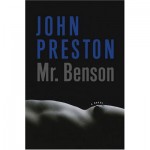 Mr. Benson by John Preston (Cleis Press, 2004). How is it possible that I did not read this book until last year?? I can’t believe I missed it. And now that I’ve read it, any time I mention it to queer folks—especially ones older than me—they all know about it, and know it well. So: It is a gay men SM novel first published as a serial in 1979, and then in full in the early 1980s. It’s from a time before the AIDS crisis. More good stuff on John Preston over at GLBTQ encyclopedia, if you want to know more context. The book is dirty and full of power and strength and dominance. The actual storyline is a little boring (I just wasn’t as invested in the human trafficking/exploitation part as I was in the beautiful D/s scenes), but the book does need something to keep it going. Apparently the book was so popular that there were both “Looking for Mr. Benson” and “Looking for Mr. Benson?” tee shirts all over in the ’80s, though of course they are not around now, at least not that I could find. I handed the book to Kristen as soon as I was done and she zoomed through it, then had a “Looking for Mr. Benson?” tee shirt made for me for winter solstice. It prompted me to think a lot about how I play with dominance, especially in my domestic life with Kristen, and we have talked about it frequently while trying to iron out difficulties between us in that play. And who knew piss play could be so awesome?
Mr. Benson by John Preston (Cleis Press, 2004). How is it possible that I did not read this book until last year?? I can’t believe I missed it. And now that I’ve read it, any time I mention it to queer folks—especially ones older than me—they all know about it, and know it well. So: It is a gay men SM novel first published as a serial in 1979, and then in full in the early 1980s. It’s from a time before the AIDS crisis. More good stuff on John Preston over at GLBTQ encyclopedia, if you want to know more context. The book is dirty and full of power and strength and dominance. The actual storyline is a little boring (I just wasn’t as invested in the human trafficking/exploitation part as I was in the beautiful D/s scenes), but the book does need something to keep it going. Apparently the book was so popular that there were both “Looking for Mr. Benson” and “Looking for Mr. Benson?” tee shirts all over in the ’80s, though of course they are not around now, at least not that I could find. I handed the book to Kristen as soon as I was done and she zoomed through it, then had a “Looking for Mr. Benson?” tee shirt made for me for winter solstice. It prompted me to think a lot about how I play with dominance, especially in my domestic life with Kristen, and we have talked about it frequently while trying to iron out difficulties between us in that play. And who knew piss play could be so awesome?
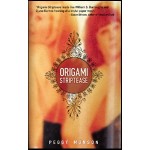 Origami Striptease by Peggy Munson (Suspect Thoughts Press, 2006). I’ve had this one on my shelf for a few years, not sure where I picked it up but I didn’t know much about it. I started reading it and was hooked: It is so ethereal, so surreal, at times it reads like poetry. The intention and clarity behind the word choices are so specific. It reminds me of Rebecca Brown or Jeanette Winterson, two of my favorite authors. I love getting lost in words and images like I did while reading this. Looks like it’s a little bit out of print now, which is too bad. Maybe the publisher still has it directly.
Origami Striptease by Peggy Munson (Suspect Thoughts Press, 2006). I’ve had this one on my shelf for a few years, not sure where I picked it up but I didn’t know much about it. I started reading it and was hooked: It is so ethereal, so surreal, at times it reads like poetry. The intention and clarity behind the word choices are so specific. It reminds me of Rebecca Brown or Jeanette Winterson, two of my favorite authors. I love getting lost in words and images like I did while reading this. Looks like it’s a little bit out of print now, which is too bad. Maybe the publisher still has it directly.
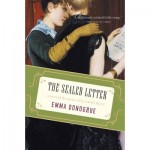 The Sealed Letter by Emma Donoghue. Historical fiction that recounts a divorce trial in the 1860s. I’m not so in to historical fiction, though on occasion I find it fascinating—particularly when I find it relevant, which, for the most part, I don’t find the genre, but I have found some of the recent books, like Sarah Waters’s novels, with lesbian content. I read this one for my book group, and I was skeptical—it took a while to really get into it. The first half of the book is elaborate descriptions of the two women’s friendship, and the details that lead up to the divorce, then the divorce trial happens for another 1/3 of the book (which I found terribly dull, though my lawyer friend thought was fascinating)—but the very end made it worth it. Though I was a bit triggered by all the psychological manipulation one of the characters continues to exhibit, I have still been recommending this quite a bit. It’s pretty fascinating to hear about the politics of marriage, family, cheating, and legality from 150 years ago—really not that long ago, but it exposes some of the ways we have directly evolved from those cultural standards.
The Sealed Letter by Emma Donoghue. Historical fiction that recounts a divorce trial in the 1860s. I’m not so in to historical fiction, though on occasion I find it fascinating—particularly when I find it relevant, which, for the most part, I don’t find the genre, but I have found some of the recent books, like Sarah Waters’s novels, with lesbian content. I read this one for my book group, and I was skeptical—it took a while to really get into it. The first half of the book is elaborate descriptions of the two women’s friendship, and the details that lead up to the divorce, then the divorce trial happens for another 1/3 of the book (which I found terribly dull, though my lawyer friend thought was fascinating)—but the very end made it worth it. Though I was a bit triggered by all the psychological manipulation one of the characters continues to exhibit, I have still been recommending this quite a bit. It’s pretty fascinating to hear about the politics of marriage, family, cheating, and legality from 150 years ago—really not that long ago, but it exposes some of the ways we have directly evolved from those cultural standards.
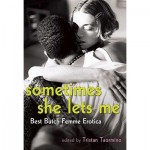 Sometimes She Lets Me: Best Butch Femme Erotica edited by Tristan Taormino (Cleis Press, 2010). Call me biased if you like, because I have a story in this book, but this is my favorite erotica collection to come out for a long time. Not only because it’s butch/femme, but also because the stories are just good. Editor Taormino had a decade worth of Best Lesbian Erotica collections to pull from, and she picked the best of the best of the best, in my opinion. Plus, there aren’t very many explicitly butch and femme erotica anthologies, so I’m glad we’ve got one more. This one is still on my nightstand. My review on Sugarbutch.
Sometimes She Lets Me: Best Butch Femme Erotica edited by Tristan Taormino (Cleis Press, 2010). Call me biased if you like, because I have a story in this book, but this is my favorite erotica collection to come out for a long time. Not only because it’s butch/femme, but also because the stories are just good. Editor Taormino had a decade worth of Best Lesbian Erotica collections to pull from, and she picked the best of the best of the best, in my opinion. Plus, there aren’t very many explicitly butch and femme erotica anthologies, so I’m glad we’ve got one more. This one is still on my nightstand. My review on Sugarbutch.
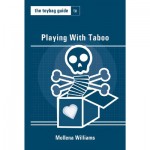 Toybag Guide to the Taboo by Mollena Williams (Greenery Press, 2010). I’m a fan of Mollena‘s work in general, and when I saw her at the Lesbian Sex Mafia for her workshop Taboo Play and Working Through Extremes in early 2010 I admired her even more. This book is kind of the written version of her workshop, with many of the same stories and philosophies about what it’s like to be exploring the “taboo” sides of sexuality, like incest play, bestiality, force, and race play, and it is thoroughly thoughtful. Obviously Mollena has been thinking about these things for a long time, and it shows with her respect, care, and detail.
Toybag Guide to the Taboo by Mollena Williams (Greenery Press, 2010). I’m a fan of Mollena‘s work in general, and when I saw her at the Lesbian Sex Mafia for her workshop Taboo Play and Working Through Extremes in early 2010 I admired her even more. This book is kind of the written version of her workshop, with many of the same stories and philosophies about what it’s like to be exploring the “taboo” sides of sexuality, like incest play, bestiality, force, and race play, and it is thoroughly thoughtful. Obviously Mollena has been thinking about these things for a long time, and it shows with her respect, care, and detail.
Follow my author profile over at GoodReads if you’d like to see more of the books I’m reading.
So let’s hear it: What were YOUR favorite books of 2010? What are you reading right now? What else do you recommend that I read?

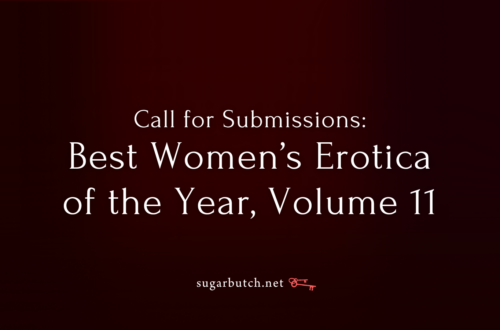
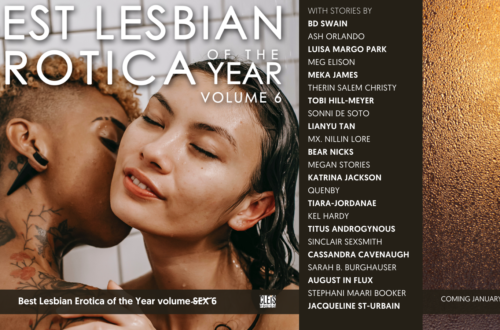
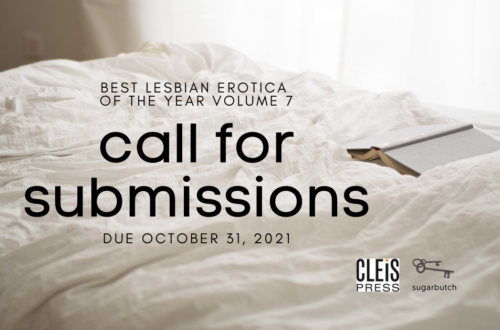
I’m delighted you enjoyed the Aud books! FYI, the order they go in is: The Blue Place, Stay, then Always.
Fans of scifi must go and find Nicola Griffith’s earlier brilliant novels Ammonite and Slow River. Her partner Kelley Eskridge’s first novel, Solitaire, also great scifi.